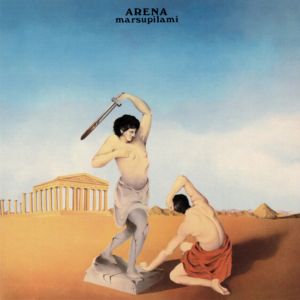
- Format: MP3

Japan 24-Bit Remaster
This concept album about the drama of the gladiator's arena during the Roman Empire is the second of two intriguing albums Marupilami recorded in the early 70s. The pair of proto-prog albums are of almost equal strength, and both are worth investigating. While the first album wins marks for being such a unique work and sounding like very little like anything that came before it, Arena's greater variety in terms of instrumentation probably tips the scale in its favour.
Prelude To the Arena: The Undertones Of Violence In A Drifting Generation begins with some threatening noises from lead vocalist Fred Hasson over some frenzied attacks but soon settles down into a truly beautiful melancholic passage with acoustic guitar, flute and mellotron. Fast-paced jazzy vocals and a great electric piano solo from Leary Hasson take this piece home
The second track Peace Of Rome: They Manufactured Death To Keep The Peace, has a nice, dark mid-section led of course by organ and flute, before a searing special from Dave Laverock (actually the best guitar solo I've heard from him) takes the music to a new level. Marsupillami's longest song The Arena (The Fighting, The Killing, The Mother Of Fornication) doesn't start off so well but after a couple of minutes becomes an outstanding organ-dominated psychedelic improvisation, drawing heavily from Eastern themes, with drummer Mike Fouracre also making his presence felt. This track loses momentum, but again resolves itself towards the end, even if the very last notes of the song seem unbearably harsh
Time Shadows (Lay Low The Past, The Future Brings Hope) is a sombre, almost eerie affair, with Jessica Stanley Clarke's flute and Leary Harsson's organ doing a good job in building up an atmosphere (Fred Hasson's harmonica works rather less well). It eventually breaks into jazzy flute driven prog. There's some nice piano playing, and another pleasing surprise when a saxophone kicks in to good effect. Laverock's jazz guitar solo is also of note, while the ferentic stomping conclusion to the piece ensures that a good time is had by all.
The closer Spring is another strange one With a pastoral acoustic guitar/organ/flute opening giving way to a veritable cacophany of sound for more than a minute before a beautiful almost soft-rock passage comes into play. This portion is rather remiscent of Camel's tamest moments which is perhaps no surprise given that future Camel stalwart Peter Bardens produced this album. There's a harmonica solo, a powerful jam with an eerie conclusion and a restatement of the soft-rock passage before the show shuts down.
By and large Arena is an album that doesn't really follow any precedents, which is exactly what makes it, to my mind, so darned fresh. ... 80% on the MPV scale [Review by Trotsky, progarchives]